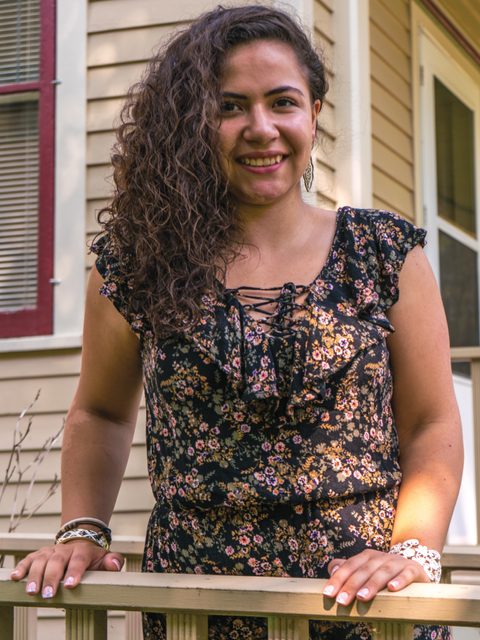 Juggling a stressful first year at Carleton, a work-study job, a part-time job, and the home business she and her mother run was wearing on Danny Campos Gonzalez ’20. She’d often return to her dorm room around 10:30 p.m. exhausted from the long day. Her floor mates suggested she not work quite so much.
Juggling a stressful first year at Carleton, a work-study job, a part-time job, and the home business she and her mother run was wearing on Danny Campos Gonzalez ’20. She’d often return to her dorm room around 10:30 p.m. exhausted from the long day. Her floor mates suggested she not work quite so much.
“They didn’t understand,” Campos Gonzalez says, “I had to.”
Coming from a single-parent, immigrant family, Campos Gonzalez found it easy to feel lonely on fourth Myers. She was born in Colombia amid civil war, and her father, a politician, was assassinated when she was six. No longer safe, her mother brought her and her sister to St. Louis Park, Minnesota, where Campos Gonzalez was often the only minority in her honors and AP classes. She enrolled at Carleton because she liked the emphasis it put on diversity—but still, in her dorm she was different both racially and socioeconomically. Many of her friends would talk about their expensive clothes and extravagant vacations. “I wouldn’t always want to join in the conversation because I didn’t want to single myself out,” she says.
She found relief through TRIO. Led by director Trey Williams, TRIO has been at Carleton since 1981 to support low-income and first-generation college students, as well as students with documented disabilities. Located in a cozy house where students can hang out, study, and relate to one another, TRIO aims to help its students overcome social, financial, and academic challenges to participate fully in college and graduate.
“We have to remember our students made the difficult decision to leave home and pursue their passion of higher education, and in that pursuit they also left behind their families,” Williams says. “Many of them are the first in their family to attend college, let alone travel as far as they have. They have an enormous amount of pressure to succeed.”
TRIO gave Campos Gonzalez a sense of community—and more. The program provides tangible help to its students such as free textbooks, which Campos Gonzalez says are an enormous help. She wasn’t in the program her first two terms at Carleton, and paying hundreds of dollars out of pocket had been almost impossible because she lives paycheck to paycheck. TRIO also helped her find funding for housing and funding that allowed her to work fewer hours as a barista in order to devote more time to an unpaid internship with HealthPartners.
TRIO is federally funded, which means there are restrictions on how funds can be used. However, TRIO at Carleton has also established a separate account that anyone can contribute to, Williams says. This allows the program to help students experience college more holistically by taking unpaid internships, off-campus classes, and much more. “Those are great life experiences,” he says, “but our students also need to earn income. Giving to TRIO supports that.”
